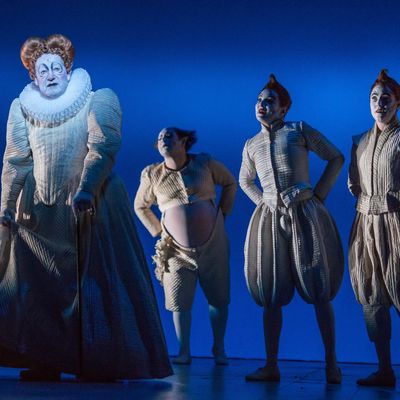
Funny thing about the avant-garde: Each new wave looks a lot like the last one. So it will come as no surprise to those who have seen a previous Robert Wilson work that his latest New York offering is crammed with his clichés: whiteface, slow-motion gliding, silhouettes, stylized hand gestures, video screens, fluorescent light, floating objects, rude noises, gibberish, wacky wigs, and impenetrable symbolism. What is a bit unexpected is that these familiar and often-amusing techniques are here applied to existing material that resists them so utterly. Resists and succumbs — for Shakespeare’s Sonnets, in which 25 of the 154 sonnets Shakespeare first published in 1609 are set to a musical score by Rufus Wainwright and deconstructed by Wilson’s staging for the Berliner Ensemble, finally overwhelms its source. And to what end? The strongest argument this BAM Next Wave Festival offering makes is for extending copyright protections to at least 405 years.
Actually, argument is not on the table. Nor is there any attempt at illustration. Wilson ignores the line-by-line sense of the poems, which are read mostly in German anyway, and are broken up in bundles of words that only sometimes relate to their meaning or prosody. Instead he picks through them, as a junkman through embers, in search of icons that might serve as characters. Among those he finds are a boy, a fool, a Cupid, a “black lady,” Queen Elizabeth I (and II), and Shakespeare himself. These then interact independently of the text, in gorgeous little dioramas of inconsequence. Suspended high up in an aperture of an upstage wall, a woman reclines in bed. Three men stand next to large filling-station tanks, aiming hoses at the audience while a bowler hat levitates. A man rides backward on a giant bicycle from stage right to stage left while a woman rides forward from stage left to stage right. I say “woman” and “man,” but it’s hard to keep straight, as Wilson has switched the genders of all the “characters” as a comment on the bisexuality of the sonnets. But the effect here is that they all just seem neuter, a disappointing loss to material that, in its original form, is fundamentally erotic.
Wainwright’s eclectic score attempts to restore some of the missing Eros, and occasionally comes close. His contemporary settings are the more convincing; in pastiche mode — of Weill, of medieval German folksong, of classical chorale — his good ear is frustrated by his limited technique. (The melodies are often little more than flaglets strung between two harmonic poles.) And although he understands the mechanism of the sonnet form, how it often moves from a statement through examples to a surprising contradiction, he can’t always get his musical forms to reflect this. Even when he does, Wilson is apt to pull the material apart, repeating portions and deleting others, so that any attempt to cling to the text as a way into the story is defeated. The first of the sonnets performed — No. 43, “When most I wink, then do mine eyes best see” — is pawed at so relentlessly, it take almost 20 monotonous minutes to die.
Which is not to say that nothing survives. The 15 members of the Berliner Ensemble troupe, trained in the dramaturgy of its founders, Bertolt Brecht and Helene Weigel, handle the movement and point-of-view fracturing with expert aplomb. Angela Schmid, as Shakespeare, and Jürgen Holtz, as Queen Elizabeth, bring coherence and dignity to their roles despite the cumbersome drag. (Holtz is pretty much left alone to deliver, beautifully, Greatest Hit No. 29: “When in disgrace with fortune and men’s eyes.”) And in what I thought was (at last) the ending, the entire company assembles almost as for the finale of a proper musical with a stirring anthemic rendition of “Farewell! Thou art too dear for my possessing” (No. 87). Alas, Wilson hadn’t finished showing off, and as the audience prepared to dash, he was still avant-garde-ing it two sonnets later as if this were some kind of 21st-century Sprockets.
The last (No. 66) was a giveaway, though, the one that begins “Tired with all these, for restful death I cry.” Hey, that Shakespeare really understood me! And when he wrote, later in the same sonnet, of “folly, doctor-like, controlling skill,” he really understood Wilson.
Shakespeare’s Sonnets is at the BAM Howard Gilman Opera House through October 12.

